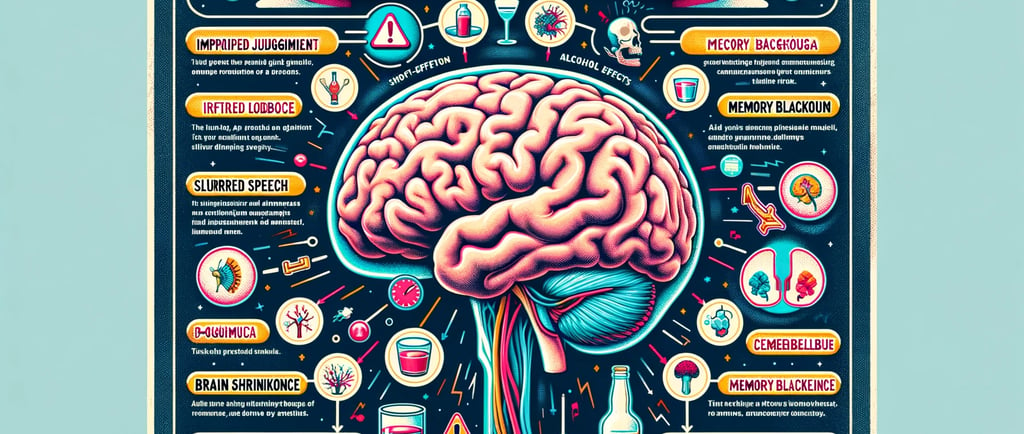What Alcohol Does to Your Brain
How Alcohol Affects the Brain
HEALTH


What Alcohol Does to Your Brain
Alcohol is one of the most commonly consumed psychoactive substances worldwide. While moderate alcohol consumption can be a part of social activities and celebrations, excessive and chronic drinking can have profound effects on the brain. Understanding these effects is crucial for making informed decisions about alcohol use and managing its impact on health and well-being.
How Alcohol Affects the Brain
When consumed, alcohol quickly enters the bloodstream and reaches the brain, where it begins to influence the central nervous system. The effects of alcohol on the brain can be both short-term and long-term, depending on the amount consumed and the frequency of use.
Short-Term Effects of Alcohol on the Brain
Euphoria and Lowered Inhibitions: Alcohol initially acts as a stimulant, increasing the release of dopamine, a neurotransmitter associated with pleasure and reward. This can lead to feelings of euphoria and lowered social inhibitions, making individuals feel more relaxed and sociable.
Impaired Judgment and Coordination: As blood alcohol levels rise, alcohol begins to depress the central nervous system. This can impair judgment, decision-making abilities, and coordination, increasing the risk of accidents and injuries.
Slurred Speech and Reduced Reaction Times: Alcohol affects the brain's communication pathways, leading to slurred speech and slower reaction times. These effects can make tasks like driving or operating machinery particularly dangerous.
Memory Blackouts: High levels of alcohol can interfere with the brain's ability to form new memories, leading to blackouts where individuals cannot recall events that occurred while intoxicated.
Altered Mood and Emotions: Alcohol can amplify emotions, causing some individuals to become more aggressive or emotional. This is due to its impact on the brain regions involved in emotional regulation.
Long-Term Effects of Alcohol on the Brain
Chronic and heavy alcohol consumption can lead to significant long-term changes in brain structure and function:
Cognitive Decline: Prolonged alcohol use can lead to cognitive impairments, including difficulties with attention, learning, and memory. These changes can persist even after alcohol use has ceased.
Wernicke-Korsakoff Syndrome: This severe neurological disorder is caused by a deficiency in thiamine (vitamin B1), which is often seen in chronic alcoholics. It consists of two stages: Wernicke's encephalopathy, which causes confusion, lack of coordination, and eye movement disturbances, followed by Korsakoff's psychosis, characterized by severe memory problems and hallucinations.
Brain Shrinkage: Studies have shown that chronic alcohol use can lead to shrinkage of brain regions, particularly the frontal lobes, which are involved in executive functions such as planning, decision-making, and impulse control.
Neuropathy: Chronic alcohol use can damage peripheral nerves, leading to neuropathy. This condition is characterized by pain, tingling, and numbness in the extremities.
Increased Risk of Mental Health Disorders: Chronic alcohol use is associated with a higher risk of developing mental health disorders, including depression and anxiety. Alcohol can exacerbate the symptoms of these conditions, creating a vicious cycle of drinking and worsening mental health.
Mechanisms of Alcohol's Effects on the Brain
Alcohol exerts its effects on the brain through several mechanisms:
GABA Receptor Activation: Alcohol enhances the activity of gamma-aminobutyric acid (GABA), a neurotransmitter that inhibits brain activity. This leads to the calming and sedative effects of alcohol.
Glutamate Inhibition: Alcohol inhibits the activity of glutamate, an excitatory neurotransmitter. This inhibition contributes to the cognitive impairments and memory blackouts associated with heavy drinking.
Dopamine Release: The initial euphoric effects of alcohol are due to the increased release of dopamine in the brain's reward pathways. However, chronic alcohol use can lead to changes in these pathways, reducing the brain's sensitivity to natural rewards and contributing to addiction.
Preventing and Mitigating the Effects of Alcohol
While moderate alcohol consumption may not have significant long-term effects on the brain, heavy and chronic use can be detrimental. Here are some tips to prevent and mitigate the effects of alcohol on the brain:
Drink in Moderation: Follow guidelines for moderate drinking, such as limiting intake to one drink per day for women and two drinks per day for men.
Take Breaks: Give your body and brain time to recover by taking regular breaks from drinking.
Stay Informed: Educate yourself about the effects of alcohol and be mindful of your consumption patterns.
Seek Help if Needed: If you struggle with controlling your alcohol use, seek support from healthcare professionals, support groups, or therapy.
Prioritize Nutrition: Ensure a balanced diet rich in vitamins and minerals, particularly thiamine, to support brain health.
Conclusion
Alcohol has a complex and multifaceted impact on the brain, influencing everything from mood and behavior to long-term cognitive function. While moderate alcohol use can be enjoyed responsibly, it is essential to be aware of the potential risks associated with heavy and chronic consumption. By understanding how alcohol affects the brain, individuals can make informed decisions about their drinking habits and take steps to protect their mental and physical health.
At Sunshare Academy, we are committed to providing comprehensive information and resources to help you make healthy lifestyle choices. Explore our articles, courses, and community support to learn more about alcohol and other important health topics.



